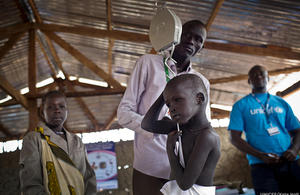Famine in South Sudan
Statement from International Development Secretary Priti Patel and summary of how UK aid is already helping.

A child is weighed as part of a nutritional assessment in Unity State, South Sudan, December 2016. Picture: UNICEF/Kate Holt
Following the declaration of famine in parts of South Sudan yesterday (Monday 20 February) – the first famine in the world for six years – there has been widespread media coverage including by the BBC, ITV, Sky, Guardian, Times, Financial Times and the Independent highlighting the worsening humanitarian crisis.
What is happening in South Sudan?
The situation in South Sudan is dire and almost half the population are in urgent need. Nearly 5 million people do not have enough food, 100,000 people are facing starvation and a million more are on the brink of famine. This is caused by prolonged conflict, ongoing violence and sexual atrocities which has displaced millions, and deteriorating drought which is threatening lives, and risks destabilising the region.
We are expecting the number of people facing the daily struggle of not having enough food to eat to rise even further.
The areas where famine has been declared have seen some of the most intense fighting between Government and opposition forces, and restrictions on access for humanitarian organisations trying to provide vital food, water and shelter for the most vulnerable people.
People are being forced to flee from their homes and almost 2,400 South Sudanese refugees are arriving in Uganda every day on average.
The UN has today launched an appeal for $1.6bn for South Sudan and has previously highlighted the growing risk of genocide and widespread atrocities if the conflict escalates. The world can’t allow that.
What has UK aid achieved?
Last year, UK aid in South Sudan:
- Reached 440,000 people with food
- Provided clean water and sanitation for 490,000 people
- Provided 660,000 people with health and medical support, including mothers and children
- Provided 130,000 people with shelter
- Treated 360,000 children against severe acute malnutrition.
In 2016, the UK’s support to Uganda provided:
- food for 650,000 people including 45,000 children
- shelter for 56,250 people
- blankets, water containers and sanitary towels for 64,000 people
- Vaccinations for 210,000 children.
What is the UK doing?
The UK has led the way in providing support to vulnerable people in South Sudan, giving over £500 million over the last three years to ensure millions get urgently needed food, water and medicine, as well as longer term support to provide much-needed education. We are helping more than 1 million children to go to school and supporting over 1,000 health facilities to cope with two years of civil war.
We are also providing support for the region, bolstering help for neighbouring countries such as Uganda – now the largest refugee-hosting nation in Africa with over one million refugees - to cope with the influx of South Sudanese families who have been forced to flee their homes. The vast majority (85%) of those arriving are women and children in dire need of assistance and protection.
This year, up to 400 UK troops will deploy to support the UN Mission in South Sudan (UNMISS), providing vital engineering and medical assistance to help improve security at UN camps and support UNMISS’s capacity to protect civilians and ensure humanitarian access, which is central to their mission.
We are working with the international community to support the African Union and region to pressure the Government of South Sudan to engage meaningfully in peace and in a genuinely inclusive dialogue. We are also working through the UN to ensure the Government are held to account and we are strong supporters of an arms embargo and placing sanctions on individuals who are driving the conflict.
International Development Secretary Priti Patel said:
This is an urgent and severe crisis, with almost half the population in desperate need.
Almost 5 million face the daily threat of going without enough food and water and 3 million people have been forced from their homes because of ruthless violence and widespread use of rape.
The UK is ensuring millions of people in South Sudan get urgently needed food, water and medicine, as well as longer term support.
The UK will not look the other way while people of South Sudan suffer: the Government of South Sudan must put an end to ethnic violence, allow humanitarian access and deliver long-lasting peace.
The international community now needs to step up alongside Britain to stop famine spreading and help support stability in South Sudan and the region, which is firmly in all our interests.
Find out more
For more information about how the UK is helping in South Sudan, please see: https://www.gov.uk/government/world/south-sudan